When 引导时间状语从句
- 格式:doc
- 大小:57.50 KB
- 文档页数:9
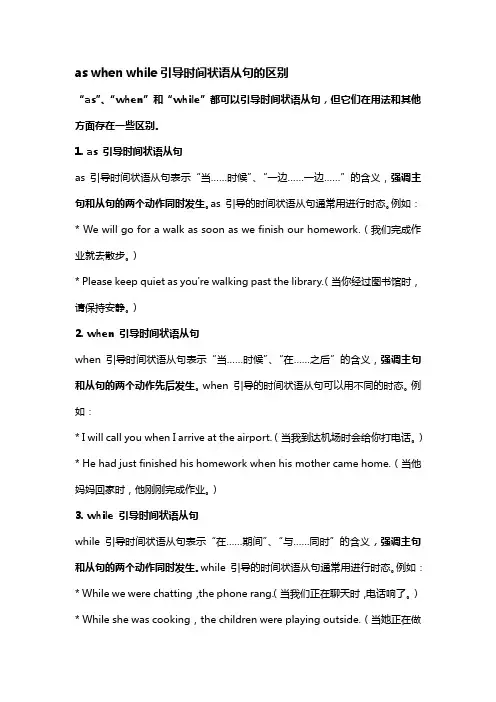
as when while引导时间状语从句的区别“as”、“when”和“while”都可以引导时间状语从句,但它们在用法和其他方面存在一些区别。
1. as 引导时间状语从句as 引导时间状语从句表示“当……时候”、“一边……一边……”的含义,强调主句和从句的两个动作同时发生。
as 引导的时间状语从句通常用进行时态。
例如:* We will go for a walk as soon as we finish our homework.(我们完成作业就去散步。
)* Please keep quiet as you're walking past the library.(当你经过图书馆时,请保持安静。
)2. when 引导时间状语从句when 引导时间状语从句表示“当……时候”、“在……之后”的含义,强调主句和从句的两个动作先后发生。
when 引导的时间状语从句可以用不同的时态。
例如:* I will call you when I arrive at the airport.(当我到达机场时会给你打电话。
)* He had just finished his homework when his mother came home.(当他妈妈回家时,他刚刚完成作业。
)3. while 引导时间状语从句while 引导时间状语从句表示“在……期间”、“与……同时”的含义,强调主句和从句的两个动作同时发生。
while 引导的时间状语从句通常用进行时态。
例如:* While we were chatting,the phone rang.(当我们正在聊天时,电话响了。
)* While she was cooking,the children were playing outside.(当她正在做饭时,孩子们在外面玩耍。
)总之,as、when和while都可以引导时间状语从句,但它们在用法和其他方面存在区别。
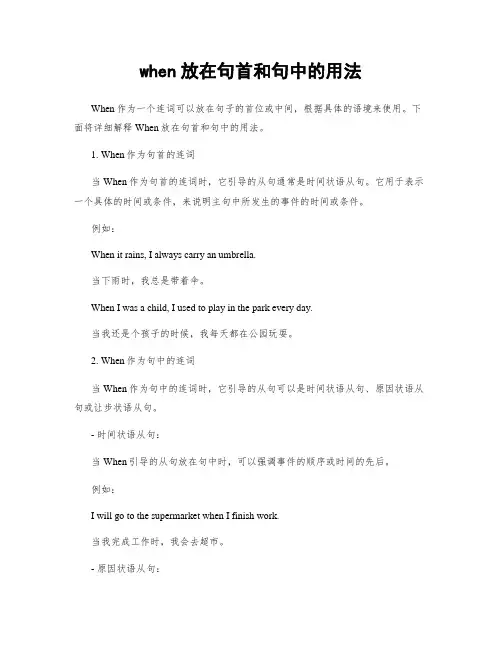
when放在句首和句中的用法When作为一个连词可以放在句子的首位或中间,根据具体的语境来使用。
下面将详细解释When放在句首和句中的用法。
1. When作为句首的连词当When作为句首的连词时,它引导的从句通常是时间状语从句。
它用于表示一个具体的时间或条件,来说明主句中所发生的事件的时间或条件。
例如:When it rains, I always carry an umbrella.当下雨时,我总是带着伞。
When I was a child, I used to play in the park every day.当我还是个孩子的时候,我每天都在公园玩耍。
2. When作为句中的连词当When作为句中的连词时,它引导的从句可以是时间状语从句、原因状语从句或让步状语从句。
- 时间状语从句:当When引导的从句放在句中时,可以强调事件的顺序或时间的先后。
例如:I will go to the supermarket when I finish work.当我完成工作时,我会去超市。
- 原因状语从句:当When引导的从句放在句中时,可以表示一个原因或理由。
例如:I couldn't sleep when I drank too much coffee.当我喝了太多咖啡时,我就无法入睡。
- 让步状语从句:当When引导的从句放在句中时,可以表示尽管某种情况存在,但结果仍然发生。
例如:Even when it's cold outside, I still enjoy going for a walk.即使外面很冷,我仍然喜欢去散步。
总结:无论When放在句首还是句中,它都用于引导从句。
当When放在句首时,引导时间状语从句;而当When放在句中时,可以引导时间状语从句、原因状语从句或让步状语从句。
根据具体的语境,我们可以准确地使用When来描述事件的时间、条件、原因或让步。
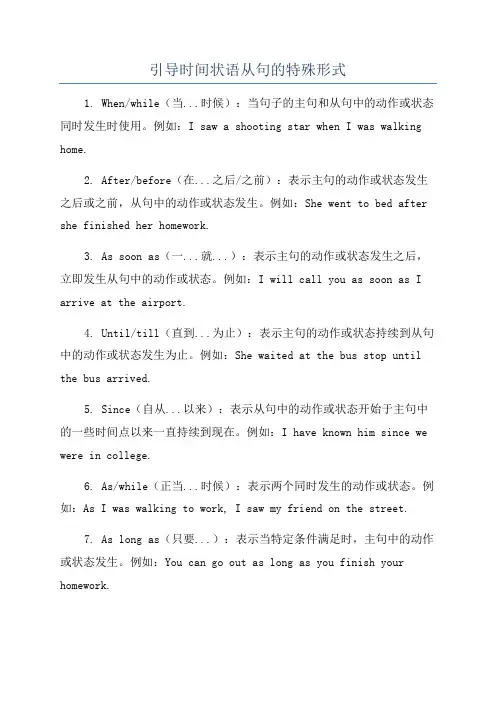
引导时间状语从句的特殊形式
1. When/while(当...时候):当句子的主句和从句中的动作或状态同时发生时使用。
例如:I saw a shooting star when I was walking home.
2. After/before(在...之后/之前):表示主句的动作或状态发生之后或之前,从句中的动作或状态发生。
例如:She went to bed after she finished her homework.
3. As soon as(一...就...):表示主句的动作或状态发生之后,立即发生从句中的动作或状态。
例如:I will call you as soon as I arrive at the airport.
4. Until/till(直到...为止):表示主句的动作或状态持续到从句中的动作或状态发生为止。
例如:She waited at the bus stop until the bus arrived.
5. Since(自从...以来):表示从句中的动作或状态开始于主句中的一些时间点以来一直持续到现在。
例如:I have known him since we were in college.
6. As/while(正当...时候):表示两个同时发生的动作或状态。
例如:As I was walking to work, I saw my friend on the street.
7. As long as(只要...):表示当特定条件满足时,主句中的动作或状态发生。
例如:You can go out as long as you finish your homework.。
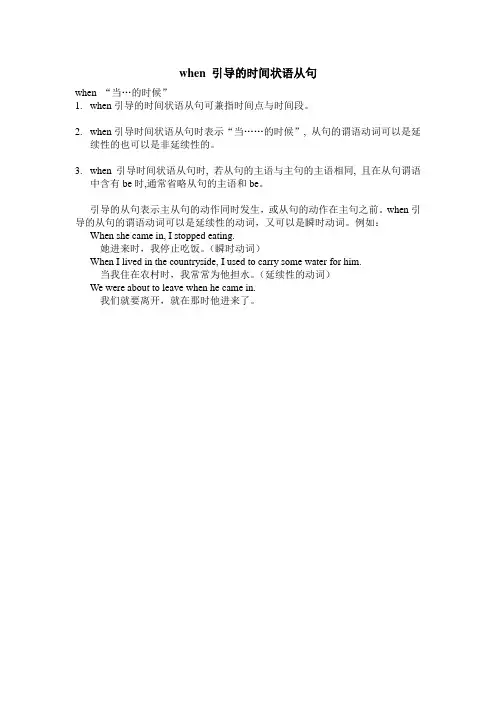
when 引导的时间状语从句
when “当…的时候”
1.when引导的时间状语从句可兼指时间点与时间段。
2.when引导时间状语从句时表示“当……的时候”, 从句的谓语动词可以是延
续性的也可以是非延续性的。
3.when引导时间状语从句时, 若从句的主语与主句的主语相同, 且在从句谓语
中含有be时,通常省略从句的主语和be。
引导的从句表示主从句的动作同时发生,或从句的动作在主句之前。
when引导的从句的谓语动词可以是延续性的动词,又可以是瞬时动词。
例如:When she came in, I stopped eating.
她进来时,我停止吃饭。
(瞬时动词)
When I lived in the countryside, I used to carry some water for him.
当我住在农村时,我常常为他担水。
(延续性的动词)
We were about to leave when he came in.
我们就要离开,就在那时他进来了。
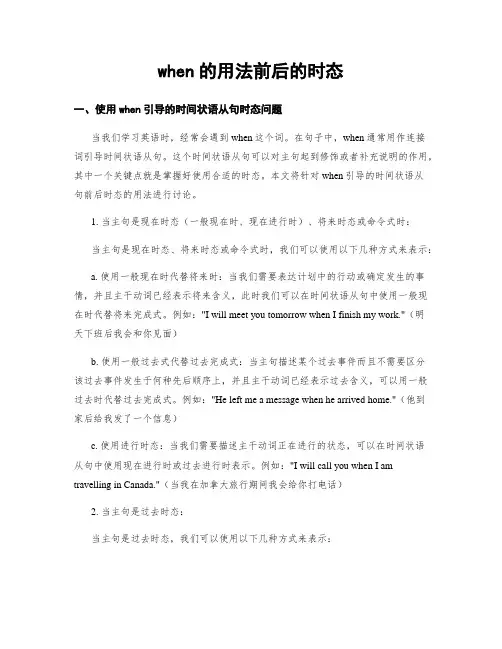
when的用法前后的时态一、使用when引导的时间状语从句时态问题当我们学习英语时,经常会遇到when这个词。
在句子中,when通常用作连接词引导时间状语从句。
这个时间状语从句可以对主句起到修饰或者补充说明的作用,其中一个关键点就是掌握好使用合适的时态。
本文将针对when引导的时间状语从句前后时态的用法进行讨论。
1. 当主句是现在时态(一般现在时、现在进行时)、将来时态或命令式时:当主句是现在时态、将来时态或命令式时,我们可以使用以下几种方式来表示:a. 使用一般现在时代替将来时:当我们需要表达计划中的行动或确定发生的事情,并且主干动词已经表示将来含义,此时我们可以在时间状语从句中使用一般现在时代替将来完成式。
例如:"I will meet you tomorrow when I finish my work."(明天下班后我会和你见面)b. 使用一般过去式代替过去完成式:当主句描述某个过去事件而且不需要区分该过去事件发生于何种先后顺序上,并且主干动词已经表示过去含义,可以用一般过去时代替过去完成式。
例如:"He left me a message when he arrived home."(他到家后给我发了一个信息)c. 使用进行时态:当我们需要描述主干动词正在进行的状态,可以在时间状语从句中使用现在进行时或过去进行时表示。
例如:"I will call you when I am travelling in Canada."(当我在加拿大旅行期间我会给你打电话)2. 当主句是过去时态:当主句是过去时态,我们可以使用以下几种方式来表示:a. 使用过去完成时:当我们需要表达两个已经发生的事件,并且需要明确它们之间的顺序关系,可以使用过去完成式。
例如:"She cried when she had watched the movie."(她看完电影才哭了起来)b. 使用一般过去式:当不需要区分两个过去事件先后顺序时,可以使用一般过去式。
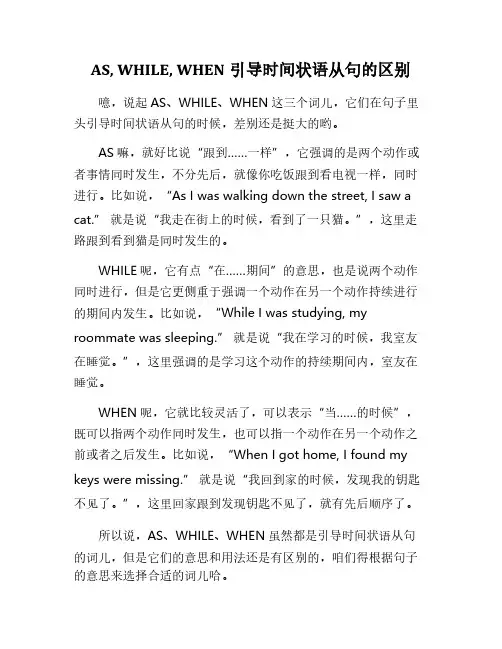
AS,WHILE,WHEN引导时间状语从句的区别噫,说起AS、WHILE、WHEN这三个词儿,它们在句子里头引导时间状语从句的时候,差别还是挺大的哟。
AS嘛,就好比说“跟到……一样”,它强调的是两个动作或者事情同时发生,不分先后,就像你吃饭跟到看电视一样,同时进行。
比如说,“As I was walking down the street,I saw a cat.”就是说“我走在街上的时候,看到了一只猫。
”,这里走路跟到看到猫是同时发生的。
WHILE呢,它有点“在……期间”的意思,也是说两个动作同时进行,但是它更侧重于强调一个动作在另一个动作持续进行的期间内发生。
比如说,“While I was studying,my roommate was sleeping.”就是说“我在学习的时候,我室友在睡觉。
”,这里强调的是学习这个动作的持续期间内,室友在睡觉。
WHEN呢,它就比较灵活了,可以表示“当……的时候”,既可以指两个动作同时发生,也可以指一个动作在另一个动作之前或者之后发生。
比如说,“When I got home,I found my keys were missing.”就是说“我回到家的时候,发现我的钥匙不见了。
”,这里回家跟到发现钥匙不见了,就有先后顺序了。
所以说,AS、WHILE、WHEN虽然都是引导时间状语从句的词儿,但是它们的意思和用法还是有区别的,咱们得根据句子的意思来选择合适的词儿哈。
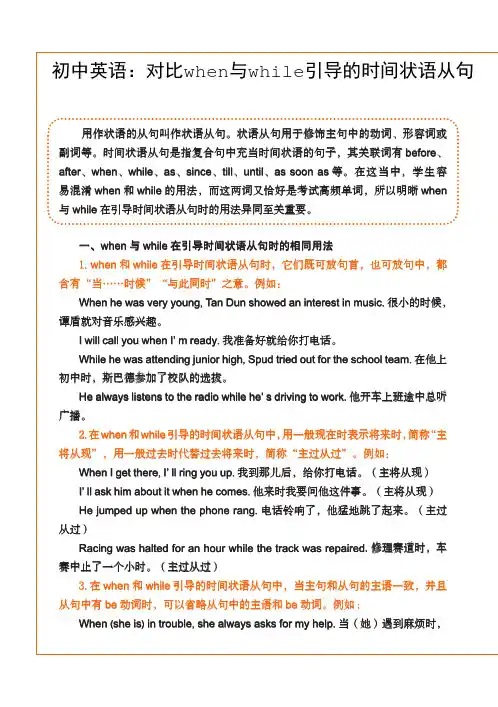
她总会寻求我的帮助。
He was fond of swimming when (he was) yet a child. 他还是孩子时,就喜欢
游泳。
He cut himself while (he was) shaving. 他在刮胡子时刮伤了自己。
4.在when和while引导的时间状语从句中,当主句和从句的主语不一致,但
是属于泛指意义的代词you时,从句中的主语和be动词也可省略。
例如:When (you are) in Rome, do as the Romans do. 入乡随俗。
A good way to master English is to spend holidays in English speaking coun-tries, and while (you are) there, talk to native speakers. 掌握英语的一个好方法是
在说英语的国家度假,当你在那里时,与英语母语人士多交谈。
5.在when和while引导的时间状语从句中,当从句和主句的主语不一致,但
是从句主语和主句中的宾语一致时,从句中的主语和be动词也可省略。
例如:He told me to remain silent when (I was) not asked. 当(我)没有被问到时,
他告诉我保持沉默。
She told her son not to talk while (he was) eating. 她告诉她儿子在(他)吃饭
时不要说话。
7。
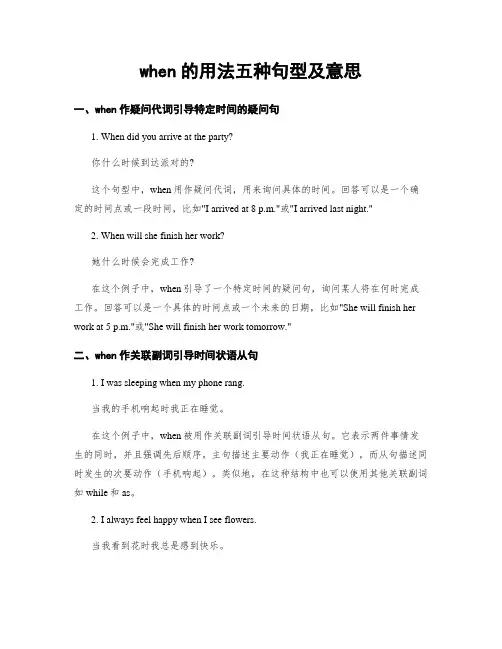
when的用法五种句型及意思一、when作疑问代词引导特定时间的疑问句1. When did you arrive at the party?你什么时候到达派对的?这个句型中,when用作疑问代词,用来询问具体的时间。
回答可以是一个确定的时间点或一段时间,比如"I arrived at 8 p.m."或"I arrived last night."2. When will she finish her work?她什么时候会完成工作?在这个例子中,when引导了一个特定时间的疑问句,询问某人将在何时完成工作。
回答可以是一个具体的时间点或一个未来的日期,比如"She will finish her work at 5 p.m."或"She will finish her work tomorrow."二、when作关联副词引导时间状语从句1. I was sleeping when my phone rang.当我的手机响起时我正在睡觉。
在这个例子中,when被用作关联副词引导时间状语从句。
它表示两件事情发生的同时,并且强调先后顺序。
主句描述主要动作(我正在睡觉),而从句描述同时发生的次要动作(手机响起)。
类似地,在这种结构中也可以使用其他关联副词如while和as。
2. I always feel happy when I see flowers.当我看到花时我总是感到快乐。
这个例子展示了when引导时间状语从句,描述在特定情况下发生的一般动作。
主句表达一个经常性的感觉,而从句则指明特定触发条件(看到花)。
在这种结构中,也可以使用其他关联副词如whenever和every time。
三、when作连词引导条件状语从句1. You will succeed when you work hard.当你努力工作时你会成功。
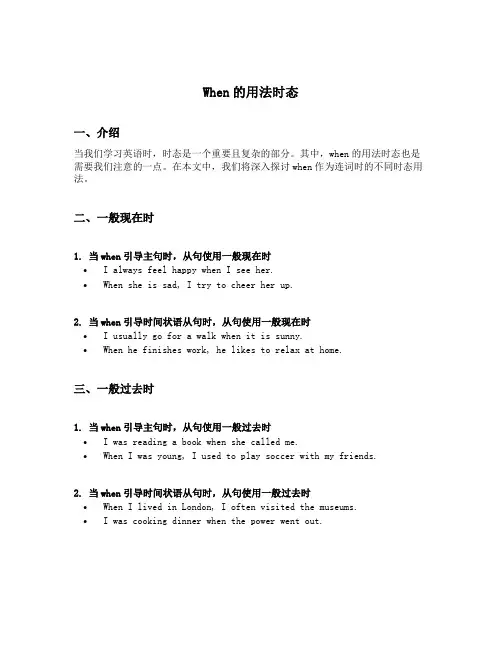
When的用法时态一、介绍当我们学习英语时,时态是一个重要且复杂的部分。
其中,when的用法时态也是需要我们注意的一点。
在本文中,我们将深入探讨when作为连词时的不同时态用法。
二、一般现在时1. 当when引导主句时,从句使用一般现在时•I always feel happy when I see her.•When she is sad, I try to cheer her up.2. 当when引导时间状语从句时,从句使用一般现在时•I usually go for a walk when it is sunny.•When he finishes work, he likes to relax at home.三、一般过去时1. 当when引导主句时,从句使用一般过去时•I was reading a book when she called me.•When I was young, I used to play soccer with my friends.2. 当when引导时间状语从句时,从句使用一般过去时•When I lived in London, I often visited the museums.•I was cooking dinner when the power went out.四、现在进行时1. 当when引导主句时,从句使用现在进行时•She is always laughing when I see her.•When I am studying, I prefer to listen to music.2. 当when引导时间状语从句时,从句使用现在进行时•I will call you when I am leaving the office.•When it is raining, I like to stay indoors and watch movies.五、过去进行时1. 当when引导主句时,从句使用过去进行时•I was sleeping when the phone rang.•When he arrived, I was having dinner.2. 当when引导时间状语从句时,从句使用过去进行时•When I was traveling in Europe, I was staying in hostels.•I was studying for my exams when my friends came over.六、一般将来时1. 当when引导主句时,从句使用一般将来时•I will call you when I arrive at the airport.•When she finishes her project, she will take a vacation.2. 当when引导时间状语从句时,从句使用一般将来时•I will go shopping when I have some free time.•When the rain stops, we will go for a walk.七、过去将来时1. 当when引导主句时,从句使用过去将来时•I thought of you when I was going to bed last night.•When he told me the news, I was about to leave.2. 当when引导时间状语从句时,从句使用过去将来时•I was going to call you when I saw your missed call.•When I was about to leave, the bus arrived.八、总结通过本文的介绍,我们了解了when作为连词时在不同时态下的用法。
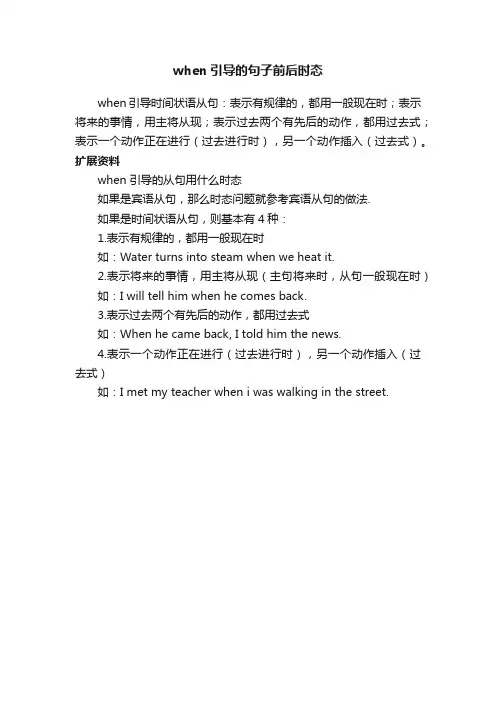
when引导的句子前后时态
when引导时间状语从句:表示有规律的,都用一般现在时;表示将来的事情,用主将从现;表示过去两个有先后的动作,都用过去式;表示一个动作正在进行(过去进行时),另一个动作插入(过去式)。
扩展资料
when引导的从句用什么时态
如果是宾语从句,那么时态问题就参考宾语从句的做法.
如果是时间状语从句,则基本有4种:
1.表示有规律的,都用一般现在时
如:Water turns into steam when we heat it.
2.表示将来的事情,用主将从现(主句将来时,从句一般现在时)
如:I will tell him when he comes back.
3.表示过去两个有先后的动作,都用过去式
如:When he came back, I told him the news.
4.表示一个动作正在进行(过去进行时),另一个动作插入(过去式)
如:I met my teacher when i was walking in the street.。
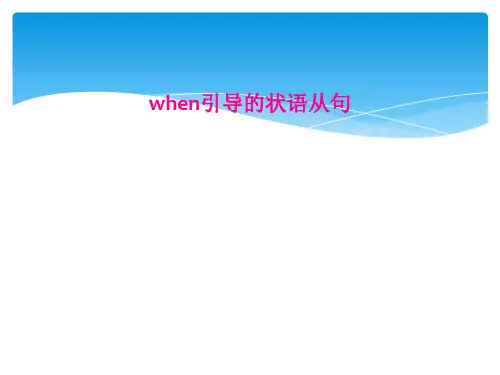
when then用法"when"和"then"都是英语中常用的词汇,有各自的用法。
以下是它们的用法解释:1."When" 是一个关系副词,常用于引导时间状语从句,表示在某个时间点或者条件下发生的情况。
例如:- I will go to the beach when it stops raining. (当雨停下来时,我会去海滩。
)- She was studying English when I called her. (我给她打电话时,她正在学习英语。
)2."Then"也可以用作一个副词,有多种用法:- 表示时间的连续:常用于表示接下来或者紧接着的动作或情况。
例如:- First, we will prepare the ingredients. Then, we can start cooking. (首先,我们会准备好材料。
接着,我们可以开始烹饪。
)- I finished my work, and then I went home. (我完成了工作,然后我回家了。
)- 表示因果关系:表示前面发生的事情导致或者引起后面发生的事情。
例如:- If you study hard, then you will pass the exam.(如果你努力学习,那么你就会通过考试。
)- 表示那个时候、那时候:表示过去发生的事情。
例如:- I was young back then.(那时候我还年轻。
)总结起来,"when" 引导时间状语从句,表示某个时间点或条件下发生的情况,而"then"主要表示接下来、因果关系或表示过去的时间。
它们在不同的语境中有不同的用法,请根据上下文来确定正确的使用方式。
【主题】when引导的时间状语从句和宾语从句的区别1. 介绍时间状语从句和宾语从句是中文语法中常见的句子结构,它们都是从句的一种。
在英语中,when引导的时间状语从句和宾语从句的区别是非常重要的,因为它们在句子中的作用和语法结构有着明显的差异。
本文将对这两种从句进行深入探讨,并比较它们之间的区别。
2. 时间状语从句时间状语从句是用来表示时间关系的从句,它通常由when, while, as, before, after, since等引导。
其中,以when引导的时间状语从句是最常见的一种。
这种从句可以表示主句发生的时间,或者描述主句和从句的动作同时发生。
I will call you when I arrive home. 这个句子中,when引导的时间状语从句是在描述主句中的动作发生的时间点。
3. 宾语从句宾语从句是作为及物动词的宾语出现在句中的从句,它用来充当动词的宾语,通常由that, whether, if等引导。
宾语从句可以表示对主句的陈述、疑问、感叹、要求等。
I know that he is a good student. 这个句子中,that引导的宾语从句对主句进行了陈述。
4. 区别分析时间状语从句和宾语从句的区别在于其在句子中的作用和语法结构。
时间状语从句是用来表示时间关系的,它表示主句发生的时间或者描述主句和从句的动作同时发生。
而宾语从句则是作为动词的宾语出现在句中,用来对主句进行陈述、疑问、感叹、要求等。
5. 深入理解对于学习英语的人来说,正确理解和运用时间状语从句和宾语从句是非常重要的,因为它们在语法结构和句子表达方式上有着明显的区别。
正确地使用时间状语从句可以让句子的时间关系表达更加准确和清晰,而恰当地使用宾语从句可以使句子的表达更加丰富和复杂。
6. 个人观点和总结在掌握英语语法中的从句结构时,时间状语从句和宾语从句的区别是需要重点关注和理解的部分。
通过本文的介绍和分析,相信读者可以更清楚地理解这两种从句的区别,从而在日常的学习和使用中更加准确地应用它们。
when的用法总结When(当)是一个非常常用且多功能的词汇,在英语中有多种用法和含义。
本文将对一些常见的用法进行总结和解释,以帮助读者更好地理解和运用when。
1. 引导时间状语从句When经常用来引导时间状语从句,表示某个动作或事件发生的具体时间或条件。
例如:- I will call you when I arrive.(当我到达时,我会给你打电话。
)- He was studying when the phone rang.(电话响的时候,他正在学习。
)2. 引导条件状语从句When也可以用来引导条件状语从句,表示在特定条件下发生的情况。
例如:- When it rains, I prefer to stay indoors.(下雨时,我更喜欢待在室内。
)- She will go to the party when she finishes her work.(她完成工作后会去参加派对。
)3. 引导让步状语从句When有时候可用于引导让步状语从句,表示尽管某种情况发生,但另一种情况仍然成立。
例如:- He stayed calm when everything around him was chaotic.(当他周围一切都一片混乱时,他保持了冷静。
)- When she was tired, she kept going.(尽管她疲倦不堪,她仍然继续前进。
)4. 引导假设条件When有时用来引导假设条件,表示考虑某种可能情况下会发生的情况。
例如:- When it's his birthday, we will throw a surprise party for him.(如果是他的生日,我们将为他举办一个惊喜派对。
)- When you come to visit, I will show you around the city.(如果你来访,我会带你参观这座城市。
)5. 表示频率When可以用来表示经常发生的动作或习惯。
when引导时间状语从句的用法1. When I was a kid, I always played in the park until it got dark. Like a little adventurer, I would run around, climb trees, and have so much fun! Remember when you were a child and did similar things?2. When he goes to the gym, he really pushes himself. It's like he's a warrior determined to get stronger. Have you ever felt that kind of drive when you do something you love?3. When she gets home from work, she loves to relax and watch TV. Just like a hardworking bee returning to the hive to rest. Isn't that what we all look forward to after a long day?4. When they have a party, it's always a blast. It's as if the whole world comes alive with happiness and laughter. Don't you just love being at a great party?5. When I hear that song, it takes me back to my college days. It's like a time machine transporting me to those carefree moments. Can you relate to having a song bring back memories?6. When he sees his best friend, his face lights up. It's as if he's seeing the sun after a long, cloudy day. Don't you feel the same way when you see your closest friends?7. When she gets a promotion, she is over the moon. Just like a bird that has finally learned to fly high. Isn't it a great feeling to achieve something you've been working hard for?My view is that the usage of "when" to lead a time clause is very common and useful in our daily language. It helps us to express things clearly and vividly according to different times.。
when引导的时间状语从句时态原则
【实用版】
目录
1.引言
2.when 引导的时间状语从句的时态原则
3.示例解析
4.结论
正文
【引言】
在英语语法中,时间状语从句是修饰主句的一种从句,用来表示主句动作发生的时间。
其中,when 引导的时间状语从句是最常见的一种。
本文将探讨 when 引导的时间状语从句的时态原则。
【when 引导的时间状语从句的时态原则】
当 when 引导时间状语从句时,其时态原则如下:
1.如果主句用一般将来时,从句用一般现在时表示将来。
2.如果主句用一般现在时,从句用一般现在时表示现在或将来。
3.如果主句用一般过去时,从句用一般过去时表示过去或将来。
【示例解析】
1.When I get home, I will have dinner.(当我到家时,我将要吃饭。
)
解析:主句用一般将来时,从句用一般现在时表示将来。
2.When they arrive, they will have been waiting for two hours.(当他们到达时,他们将已经等了两个小时。
)
解析:主句用一般现在时,从句用一般现在时表示现在或将来。
3.When she finished her homework, she started to watch TV.(当她完成作业时,她开始看电视。
)
解析:主句用一般过去时,从句用一般过去时表示过去或将来。
【结论】
综上所述,when 引导的时间状语从句的时态原则取决于主句的时态。
When 引导时间状语从句1.When you visit a foreign country, it is important to know how to ask for help politely.当你去参观一个外国国家的时候,知道如何礼貌的寻求帮助那是很重要的。
2.When the teacher came in, we were talking.当老师走进来,我们正在谈论3.When I got to the airport, the guests had left.我到达机场时,客人们都已经离开了。
entire adj. 全部的,整个的例:The entire village was destroyed.整个村庄都被毁坏了。
I wasted an entire day on it. 我在这上面耗费了一整天。
entirely adv. 全部地,完整地例I entirely agree with you.我完全赞成你。
I am not entirely happy about the proposal.我并不完全对这个提议感到满意。
The audience was almost entirely female.观众几乎全都是女性。
lead v led-led带路,领路The receptionist led the way to the boardroom相通The wire led to a speaker通向,通往Which door leads to the yard?lead to sth导致Eating too much sugar can lead to health problems. lead sb (to sth)使得出,引导What led you to this conclusion?过某种生活He lead a quiet life.curious 英['kjʊərɪəs] adj 好奇的,有求知欲的;古怪的;爱挑剔的They were very curious about the people who lived upstairs.There was a curious mixture of people in audience.beaten英['bi:t(ə)n]•adj. 被打败了的;筋疲力竭的;踏平的•v. 打败(beat的过去分词)beaten track 常规;惯例;踏出来的路,踏平的路off the beaten track 鲜有人涉足地; 独辟蹊径; 偏僻地; 不走寻常路follow the beaten track 因循守旧例:I want to do something off the beaten track.dive英[daiv]•vi. 潜水;跳水;俯冲;急剧下降•n. 潜水;跳水;俯冲;扑例:He tried to escape by diving into a river.(他企图跳入河中逃走)They dived into a taxi.(他们冲进了出租车。
)Pat had earlier made a dive of 80 feet from the Bridge.早些时,帕特曾从大桥进行过80英尺高的跳水。
explore英[ɪk‘splɔː; ek-]•vt. 探索;探测;探险•vi. 探索;探测;探险例:I just wanted to explore on my own.我只是想独自考察一下。
After exploring the old part of town there is a guided tour of the cathedral.考察老城区之后,有到大教堂的导览之旅。
Let us explore the possibilities for improvement.让我们探索改善的可能性。
exploration n.探索;探测;探险例:I looked forward to the exploration of their theories.我期待着对他们的理论进行探讨。
worth英[wɜːθ]•adj. 值…的•n. 价值;财产例:A local jeweler says the pearl is worth at least $500.一位本地珠宝商说这颗珍珠至少值$500。
His mother inherited a business worth 15,000 dollars a year.他的母亲继承了一个每年盈利15000美元的商行。
Gold reserves had fallen to less than $3 billion worth.黄金储备已经降价至30亿美元以下worthwhile 英[wɜːθ'waɪl]•adj. 值得做的,值得花时间的例:The president's trip to Washington this week seems to have been worthwhile.该总统本周的华盛顿之行似乎是值得的。
worthy ['wɜːðɪ]adj. 值得的;有价值的;配得上的,相称的;可尊敬的;应…的n. 杰出人物;知名人士The bank might think you're worthy of a loan.这家银行可能认为你应该得到一笔贷款。
If you be loved, be worthy of love.如果有人爱你,你就该做个值得人爱的人。
occupy 英['ɒkjʊpaɪ]•vt. 占据,占领;居住;使忙碌例:U.S. forces now occupy a part of the country.美国军队现在占领着该国的一部分地区。
Many men still occupy more positions of power than women.许多男性仍比女性占有更多的权力职位。
dynamic英[daɪ'næmɪk]adj. 动态的;动力的;动力学的;有活力的n. 动态;动力例:He seemed a dynamic and energetic leader.他看来是个富有创新力与活力的领导。
South Asia continues to be the most dynamic economic region in the world.南亚仍然是世界上最具活力的经济区。
The dynamic of the market demands constant change and adjustment.市场的动力要求有不断的变化和调整。
set out to do sth打算开始着手做某事multiple英['mʌltɪpl]adj. 多重的;多样的;许多的n. 倍数;[电] 并联例:He died of multiple injuries.他死于多处受伤。
original 英[ə'rɪdʒɪn(ə)l; ɒ-]n. 原件;原作;原物;原型adj. 原始的;最初的;独创的;新颖的She was distracted from her original interest.她改变了自己原有的兴趣。
They accepted his advice and rescinded the original plan. 他们听从了他的劝告,撤销了原计划。
dot 英[dɒt]n. 点,圆点;嫁妆vi. 打上点vt. 加小点于tap 英[tæp]vt. 轻敲;轻打;装上嘴子vi. 轻拍;轻击;轻叩n. 水龙头;轻打例:The teacher tapped me on my shoulder.老师轻轻地拍了下我的肩膀。
The girl tapped the door with her knuckles.女孩用指关节轻轻敲门。
The secretary tapped her typewriter all morning.秘书噼里啪啦地连续打了一上午的字。
He tapped on the window.他轻叩窗子。
Someone is tapping at the door.有人在敲门。
straw 英[strɔː]n. 稻草;吸管;一文不值的东西adj. 稻草的;无价值的例:He littered the stable with fresh straw.他给马厩铺了新鲜稻草。
The barn was full of bales of straw. 这个谷仓堆满了成捆的麦杆。
flash 英[flæʃ]vt. 使闪光;反射n. 闪光,闪现;一瞬间vi. 闪光,闪现;反射adj. 闪光的,火速的A sudden flash of lightning lit everything up for a second. 突然的一道闪电刹那间把一切照亮了。
Lightning flashed among the distant dark clouds. 远处的乌云中电光闪闪。
inspiration 英[ɪnspɪ'reɪʃ(ə)n]n. 灵感;鼓舞;吸气;妙计What an inspiration she was to all around her!她对于她周围所有的人是一种多么大的鼓舞!Many poets and artists have drawn their inspiration from nature.许多诗人和艺术家从大自然中获得灵感。
current英['kʌr(ə)nt]adj. 现在的;流通的,通用的;最近的;草写的n. (水,气,电)流;趋势;涌流Under normal conditions, the ocean currents of the tropical Pacific travel from east to west. 在正常情况下,太平洋热带洋流自东流向西。
I felt a current of cool air blowing in my face. 我感到一股凉气吹在脸上。
Be aware of 意识到,清楚Smokers are well aware of the dangers to their own health. 吸烟者们都很清楚吸烟对其自身健康的那些危害。
He should have been aware of what his junior officers were doing. 他本该意识到自己部下在做什么。
stable 英['steɪb(ə)l]n. 马厩;牛棚adj. 稳定的;牢固的;坚定的vi. 被关在马厩vt. 赶入马房The price of oil should remain stable for the rest of 1992. 石油价格在1992年余下时间里应该保持稳定。